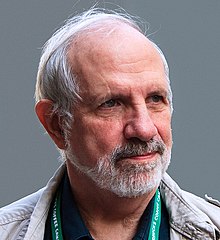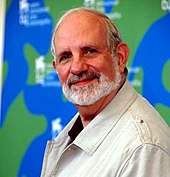Brian De Palma
Brian De Palma (* 11. September 1940 as James Giacinto De Palma jr. In Newark , New Jersey ) is an American film director .
Life
Brian De Palma, whose family has Italian roots, grew up in Philadelphia , Pennsylvania and New Hampshire . He began studying physics at Columbia University in New York , where he soon became a member of a student theater group. There he began to deal with film and to make his first short films. He dropped out of physics and was one of the first male students to go to Sarah Lawrence College in Bronxville, which had a focus on performing arts . He was awarded a scholarship for the 16mm film Wotan's Wake (1962). In the mid-1960s, his first feature film, The Wedding Party , was made in collaboration with Wilford Leach and Cynthia Munroe , but it was not released until 1969.
Brian De Palma was married three times. His first wife was the actress Nancy Allen , with whom he was married from 1979 to 1983. This was followed by his marriage to Gale Anne Hurd , with whom he has a child. From 1995 to 1997 De Palma was married to Darnell Gregorio-De Palma; A child also emerged from this relationship.
In 2015 the documentary De Palma , directed by Noah Baumbach and Jake Paltrow , was released, in which De Palma reports on his work as a director and screenwriter.
plant
His films are about tension, murder, obsession and mental disorders. Recurring themes and motifs in his films are voyeurism and surveillance, doppelgangers , multiple personalities and violence.
De Palma refers to Alfred Hitchcock in many of his films . De Palma's thrillers are based on basic themes and motifs from Hitchcock films, citing scenes and using many strategies of cinematic narration such as plan sequences and close-ups in a similar way to Hitchcock. The quotes are particularly clear in De Palma's thrillers such as Black Angel (1976), Dressed to Kill (1980) and Death Comes Twice (1984), in which he not only adopts the basic narrative and film structure of Hitchcock's films (in order: Vertigo - From the realm of the dead (1958), Psycho (1960), Das Fenster zum Hof (1954)), but also scenes, settings and camera perspectives are clearly cited. A connection between the films De Palmas and his self-declared role model Hitchcock is taken up in almost every film review of his films. Negative reviews often refer to the accusation of the Hitchcock epigone, which is often made . Positive reviews, on the other hand, often certify that De Palma's films are of equal cinematic quality and present De Palma's references to Hitchcock as positive: Roger Ebert wrote in his review of Femme Fatale that “it's not just that De Palma sometimes works in the Hitchcock style , he also has the courage to do so ”.
In terms of film technology, De Palma is best known for its extensive use of the steadicam . The so-called “ Establishing Shot ” in Spiel auf Zeit , for example, introduces the entire ensemble of actors with just one, very elaborate tracking shot. You can see a similarly long tracking shot in his film My Brother Cain . De Palma was the first to consistently use the split screen as a tension-generating film-technical means and to resort to this technique again and again (cf. e.g. Sisters and Femme Fatale) .
De Palma celebrated his first big success in 1976 with the horror thriller Carrie - Satan's youngest daughter , which is based on the book Carrie by Stephen King . In the following years he made a number of other thrillers. He celebrated great success with critics and audiences in particular with the two gangster films Scarface and The Untouchables in the mid-1980s and in 1996 with Mission: Impossible . De Palma was nominated five times for the Golden Raspberry as worst director of the year between 1981 and 2001 . After the film adaptation of the James Ellroy novel The Black Dahlia in 2006, De Palma drew attention again with Redacted (2007). The filmmaker filled the story of the everyday life of an American border post in Iraq , who is confronted with the rape and murder of an Iraqi girl and her family, with material from video images, surveillance cameras and material from YouTube and iChat . Redacted celebrated its world premiere at the 64th Venice Film Festival , where it was represented in the competition for the Golden Lion and was one of the favorites. While the main prize went to Ang Lee for his contribution Danger and Desire , De Palma was awarded the Silver Lion for best director.
In 2012 De Palma completed work on Passion , a remake of the French thriller Love and Intrigue . The film with Rachel McAdams , Noomi Rapace , Paul Anderson and Karoline Herfurth received an invitation to compete at the 69th Venice Film Festival that same year and was released in German cinemas on May 2, 2013. His subsequent feature film, the thriller Domino - A Story of Revenge with Nikolaj Coster-Waldau and Carice van Houten , was released on the Internet as a video-on-demand offer at the same time as a limited theatrical release in 2019, and also in the United Kingdom only a DVD start is provided.
Filmography (selection)
- 1960: Icarus (short film)
- 1961: 660124: The Story of an IBM Card (short film)
- 1962: Woton's Wake (short film)
- 1964: Jennifer (short film)
- 1966: Show Me a Strong Town and I'll Show You a Strong Bank (short film)
- 1966: The Responsive Eye (documentary)
- 1968: Murder à la Mod
- 1968: Greetings
- 1969: The Wedding Party
- 1970: Hi, Mom!
- 1972: Help, I'm successful! (Get to Know Your Rabbit)
- 1973: The Sisters of evil (Sisters)
- 1974: Phantom of the Paradise (Phantom of the Paradise)
- 1976: Black Angel (Obsession)
- 1976: Carrie - Satan's youngest daughter (Carrie), based on the novel Carrie by Stephen King
- 1978: Vicious Circle Alpha (The Fury)
- 1979: Home Movies - How You Me, So I You (Home Movies)
- 1980: Dressed to Kill
- 1981: Blow Out - Death erases all traces (Blow Out)
- 1983: Scarface (Scarface)
- 1984: Death Comes Twice (Body Double)
- 1986: Wise Guys - Two Super Plums in the Underworld (Wise Guys)
- 1987: The Untouchables (The Untouchables)
- 1989: The Casualties of War
- 1990: Bonfire of the Vanities (The Bonfire of the Vanities)
- 1992: My Brother Cain (Raising Cain)
- 1993: Carlito's Way
- 1996: Mission: Impossible
- 1998: Game on Time (Snake Eyes)
- 2000: Mission to Mars
- 2002: Femme Fatale
- 2006: The Black Dahlia
- 2007: Redacted
- 2012: Passion
- 2019: Domino - A Story of Revenge (Domino)
Music videos
- 1985: Bruce Springsteen - Dancing in the Dark
Awards
- Avoriaz Fantastic Film Festival 1975: Grand Prize for The Phantom in Paradise
- Avoriaz Fantastic Film Festival 1977: Grand Prize for Carrie - Satan's youngest daughter
- Berlin International Film Festival 1969 : Silver Bear for Greetings
- Blue Ribbon Award 1988: Award for the best (foreign) film for the incorruptible
- Venice International Film Festival 2007 : Silver Lion as best director for Redacted
Brian De Palma as a literary figure
- Wolfgang Bauer : The smile of Brian DePalma (1988, play in two acts; published in: Wolfgang Bauer: Werke, Vol. 8: Schauspiele 1988–1995. Graz: Droschl 1996, pp. 11–56)
literature
- Susan Dworkin: Carrie. Dressed to kill. Scarface. And now: death comes twice. Brian de Palma or how to make a thriller. A background report from the witch's kitchen of the "new Hitchcock". Bastei Lübbe, Bergisch Gladbach 1985, ISBN 3-404-13021-9 .
- Laurent Bouzereau: The DePalma Cut. Dembner Books, New York 1988, ISBN 0-942637-04-6 .
- Leonardo Gandini: Brian De Palma. Gremese publishing house, Rome 2002, ISBN 3-89472-377-7 .
- Laurence F. Knapp (Ed.): Brian De Palma - Interviews. University Press of Mississippi, Jackson 2003, ISBN 1-57806-515-1 .
- Marcus Stiglegger: [Article] Brian De Palma. In: Thomas Koebner (Ed.): Film directors. Biographies, descriptions of works, filmographies. 3rd, updated and expanded edition. Reclam, Stuttgart 2008 [1. Ed. 1999], ISBN 978-3-15-010662-4 , pp. 178-181.
Web links
- Brian De Palma in the Internet Movie Database (English)
- Literature by and about Brian De Palma in the catalog of the German National Library
- De Palma a la Mod English-language, unofficial fansite with the latest information about BDP
- English-language essay by Keith Uhlich on BDP's work up to 2003
Individual evidence
- ↑ Hannes Wesselkämper: Biography Brian de Palma ( Memento from December 14, 2013 in the Internet Archive ) On: film-zeit.de from June 2008. Retrieved on June 29, 2019.
- ↑ Ebert, Roger : Femme Fatale . In Chicago Sun-Times , November 6, 2002. Retrieved on June 29 of 2019.
- ↑ Berlin International Film Festival: Prizes & Awards 1969. Accessed June 29, 2019 .
| personal data | |
|---|---|
| SURNAME | De Palma, Brian |
| ALTERNATIVE NAMES | De Palma Jr., James Giacinto |
| BRIEF DESCRIPTION | American film director |
| DATE OF BIRTH | September 11, 1940 |
| PLACE OF BIRTH | Newark , New Jersey |


